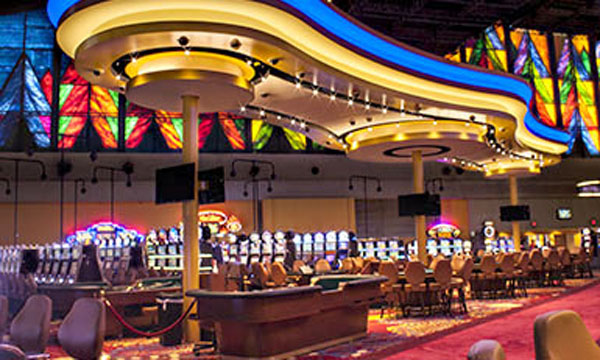 |
| Niagara Falls' share of the slot machines at the Seneca Niagara Casino is so immense that if it was used to simply reduce reduces taxes,residents would pay the lowest taxes in the nation.
|
|
|
|
|
|
(Ed note: As a possible hint to prospective mayor candidates for Niagara Falls, Mike Hudson has crafted a simple platform that could, if anyone stops to really think about it, not only get someone elected, but could solve the entire problems of the city.)
It seems so obvious a child could figure it out.
The exorbitant property taxes paid by homeowners and businesses in Niagara Falls are the single leading cause of the mass exodus of hardworking middle class people leaving the city, as well as the reluctance of outside entrepreneurs to take a chance on starting up a new business here.
Dollar for dollar, based on the value of the real estate in question Falls' residents and businesses pay the highest taxes in the region, the state and, arguably, the whole country.
The high taxes are figured into what renters pay for an apartment, what the cost of a meal is at your favorite restaurant and the price of potatoes at the grocery store.
Now get this: The total amount collected by the city for property taxes from businesses and homeowners here amounts to approximately $28.5 million annually. And the revenue the city gets under the compact between the state and the Seneca Nation of Indians is between $20 million and $25 million a year.
Some of the casino cash is spoken for in advance, of course, by the school district, the airport and the hospital, but each year the city is left with something on the order of $18 million to $20 million. Since the casino was opened in 2003, the city has taken in and burned through around $174 million in casino cash.
Former mayor Irene Elia, God bless her, didn't spend a nickel of it. Her successor in office, Vince Anello, spent around $13 million.
The rest, more than $160 million has been spent by one man – our sitting mayor, Paul Dyster. And to date, not a single permanent private sector job has been created despite that substantial outlay.
That comes as no surprise. Dyster has never created a private sector job in his whole life. He lists "businessman" on his resume, but the home beer brewing supply store he owns up Tonawanda way is not only subsidized by family money but employs only members of the Dyster family, his wife and kids.
He says he spent that $160 million on "economic development." The Hard Rock Café concert series, the Holiday Market debacle, the welfare for the rich handouts to cheap touts like Mark Hamister for his pie in the sky little box hotel downtown, the new train station and the North Main Street courthouse… These are the sorts of things Dyster thinks constitute economic development.
Take a look around. Do you see anything developing?
So how about this? We take the casino money, throw it straight into the general fund, and cut property taxes here by 75 percent.
Now, instead of being the highest taxed municipality in the nation, Niagara Falls would be one of the lowest. Suddenly, a guy who's been paying $4,000 a year in property taxes will have that reduced to $1,000.
And what's he going to do with it, put it in the bank for his retirement?
Hell no. He's going out and having a steak dinner, maybe bowl a few frames with the boys and later take in a movie with his girlfriend, then go for a couple of cocktails afterward. The next morning he'll feel guilty and give his wife the money to buy a new washer and dryer.
The restaurant, bowling alley, movie theater, saloon and appliance store will all benefit financially. And they guy himself would still have money to burn.
All around the country, people would sit up and take notice.
"Hey, wait a minute," they'd say. "You mean I could live in New York and pay half the property taxes I would in a place like North Carolina, where you can't even get a decent slice of pizza?"
Niagara Falls property values would spike immediately, instead of continuing on their downward spiral. No longer would young Community Development Director Seth Piccirillo have to pay recent college graduates to come to the city, they'd be elbowing each other out of the way to get in.
And no longer would the city's banking arm, NFC Development Corp., have to hand out millions upon millions of taxpayer dollars in order to lure new business here. The tax advantages would speak for themselves.
Suddenly the city wouldn't have to grant landlords $10,000 a unit to fix up vacant apartments. The landlords would have the money in their pockets thanks to the tax savings, and could pay for it themselves.
The size of government itself here would shrink, as a more affluent populace would have less need for the social service workers, law enforcement personnel and others whose employment is largely dependent on poverty.
And perhaps that's exactly what Dyster is afraid of. Because he clearly believes that more government is the solution to every problem, and that bureaucrats such as himself, with little or no real world experience, know how to spend your money better than you do.
Because whether we're talking real estate tax revenue, casino cash or state and federal grants, it's all your money, not City Hall's.
Labor Day weekend is just behind us, an annual reminder of the fact that each and every drop of sweat off each and every one of our brows represents a noble and worthy undertaking, deserving of reward.
Deserving of something more, anyway, than having a rich kid like our sitting mayor, take it away and tell us he knows how better to spend it than we do.
|


.jpg)